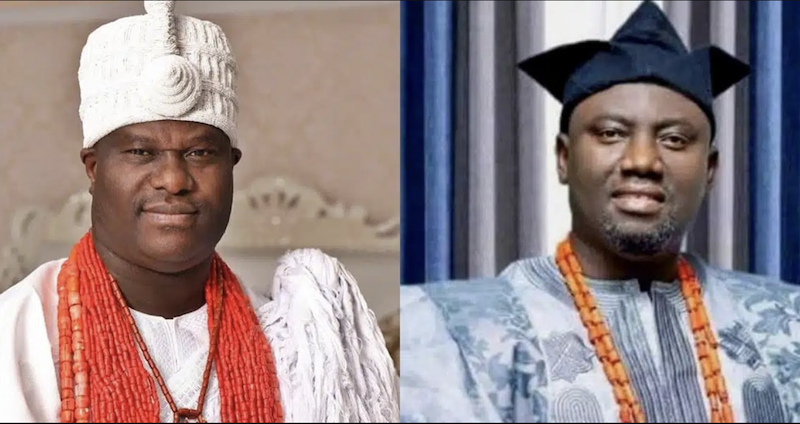The Alaafin of Oyo, Oba Akeem Owoade, on Thursday, disclosed that he is not in a supremacy battle with any monarch either in Yorubaland or anywhere in the universe.
He made this disclosure in a statement released by his Director of Media and Publicity, Bode Durojaiye, in Ibadan, the Oyo State capital.
The fresh battle between the Alaafin, Oba Owoade and the Ooni of Ife, Oba Enitan Ogunwusi, started last Monday after the Alaafin faulted the Ooni’s decision to confer the title of Okanlomo of Oduwa on a businessman, Dotun Sanusi, during the unveiling of an indigenous social media network- 2geda, at Ilaji Hotel, Ibadan, at the weekend.
The statement explained that Alaafin is a veritable custodian of Yoruba culture and tradition, and has always taken into consideration the safety and welfare of his subjects at all times. It added that the monarch relied heavily on the will and wishes of his subjects.
Durojaiye said he (Alaafin) would never compromise tradition, culture and development of his people for a pot of porridge.
He said the monarch operates a government that is judged by its result, as prosperity, security and well-being of the people dictated his popularity both in the palace and in the empire at large.
The statement reads in part, “Why Alaafin does not need to get into any battle for supremacy with any Oba, either in Yorubaland or anywhere in the universe? These immortal words of Alexander Graham Bell – The most successful men in the end are those whose success is the result of steady accretion.
“It is the man who carefully advances step by step, with his mind becoming wider and wider, and progressively be able to grasp any theme or situation -persevering in what he knows to be practical, and concentrating his thought upon it, who is bound to succeed in the greatest degree” – sum up the life voyage of Owoade, an indomitable monarch with an unequalled passion for the great good of all.
“He (Alaafin) is a veritable custodian of Yoruba culture and tradition, and has always taken into consideration the safety and welfare of his subjects and will never compromise tradition, culture and development of his people for a pot of porridge. The history has been so kind and friendly to Alaafin Owoade publicity since he ascended the throne of his forefathers, as he does not need to get into any battle for supremacy with any oba, either in Yorubaland or anywhere in the universe.
“Alaafin combines humility with royalty to meet the modern-day demands. Kabiyesi (the king who no one questions). Iku Baba Yeye (The one who commands death/he who is parent to death). Alashe (He who wields authority). Ekeji Orisha (Second-in-command to the gods). The Alaafin was inducted into the mysteries of various gods like Ifa, Sango etc to be the direct representative of these deities on earth.”
The statement added, “At the hallowed ground of the Yoruba ancient shrine, as Owoade made a covenant with illustrious Yoruba ancestors that he would defend, protect and add glamour to the Yoruba norms and tradition. Oduduwa’s Principal minister and grandson, Oranmiyan (Because Oduduwa begot Okanbi, (an only child and Okanbi begot Oranmiyan, among others, namely Ila-Orangun, Oni-Sabe, Olu-Popo, Ala-Ketu, Oba-Benin) founded the city of Oyo when prolonged drought struck Ile-Ife as a result of people’s emigration.
“Oyo simply rose to prominence through wealth gained from trade and its military skills. It was the largest West African empire, the most important and authoritative of all the early Yoruba principalities. More so, the British, as it was in their tradition, recognised lineage as meaningful supremacy and legitimacy, preferring to sign the Treaty of Cessation with the Alaafin as the Superior Head of the Yoruba Nation.
“In politics also, he is concerned about the sanctity of his position, and whatever happens on the welfare of his people. Customs and all traditional practices of today in government, religion and economic life have had distance, and possibly age-long origins which were based on valid and accepted tenets that emerged from the synthesis and aggregated experience of a particular society.
“One of such societies is the ancient city of Oyo, reputed for cultural resources that are of rich non-material and material attributes and transmitted through generations. Moreover, the precepts and concepts of Alaafin’s administration have continued to support and nurture the people’s ancient culture and sophisticated civilisation from time immemorial.
“The basic concept of government was monarchy with a rigid adherence to the monolithic Oduduwa dynasty and of the paternal line.”






































